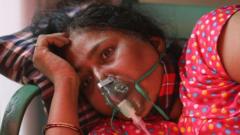On March 24, 2020, India officially entered a period of stringent lockdowns as the world braced itself for the unprecedented challenges posed by the Covid-19 pandemic. The already fragile healthcare infrastructure in India buckled under the escalating pressure, leading to catastrophic outcomes. The World Health Organization estimated that the death toll in India from Covid-19 was over 4.7 million—nearly tenfold the numbers reported by the government, which has disputed the accuracy of these claims.
Five years on, journalists from BBC India recount their harrowing journeys through this crisis, often finding themselves integrated into the very stories they reported. "Oxygen, oxygen, can you get me oxygen?” Soutik Biswas recalls a frantic call he received from a desperate woman seeking assistance for her husband, a patient in a Delhi hospital overwhelmed by the second wave of infections. The gravity of the situation hung heavily in the air, with the realization that obtaining basic medical supplies was nothing short of a battle.
As chaotic scenes unfolded in hospitals, the emotional impacts of the pandemic were palpable. Yogita Limaye narrates a haunting moment when she witnessed a woman desperately trying to rouse her brother on a stretcher, only for him to succumb to the disease before receiving any medical attention. The wave of despair, punctuated by cries for help from countless families, painted a grim picture of a nation under siege.
Vikas Pandey shares the deeply personal ramifications of the pandemic, as friends and family grappled with their own struggles, seeking lifesaving oxygen and hospital admissions. He recounts the tragic fate of a young couple facing overwhelming challenges, both battling Covid in separate hospitals. Their heartbreaking journey illustrated the profound loss experienced by many.
With her own family members impacted, Geeta Pandey reflects on her conflicting emotional landscape during the lockdown. Fearful of transmitting the virus to her elderly mother, she was left grappling with isolation and loss. The optimism surrounding vaccination efforts could not shield her from the gut-wrenching reality of her mother’s passing shortly after receiving the vaccine.
Meanwhile, Anagha Pathak shares an unsettling account of her experience documenting the plight of migrant workers stranded away from home. The sight of a heavily pregnant woman walking under the unforgiving sun is indelibly etched in her mind—a testimony of a health crisis that extended beyond just physical illness.
As they share their stories, these journalists capture the stark realities faced by countless individuals during India's lockdown and the enduring repercussions that continue to affect families and communities. The tragic occurrences they witnessed underscore not only the failures in preparedness but also serve as a clarion call to remember the human stories behind the statistics as nations navigate the long-term effects of the pandemic.





















